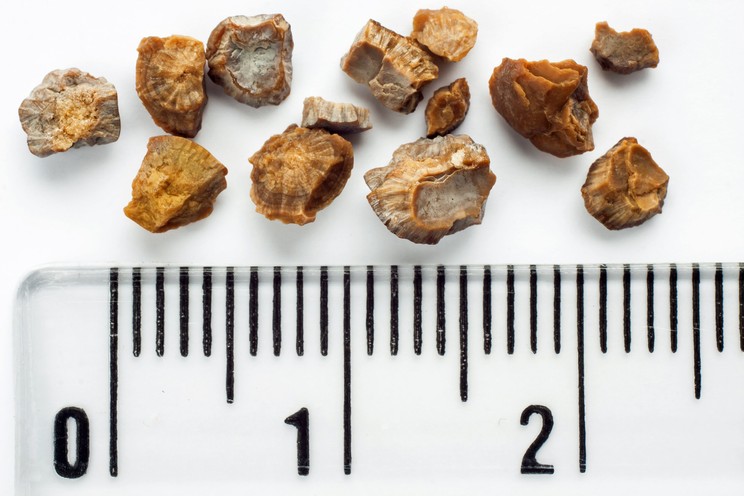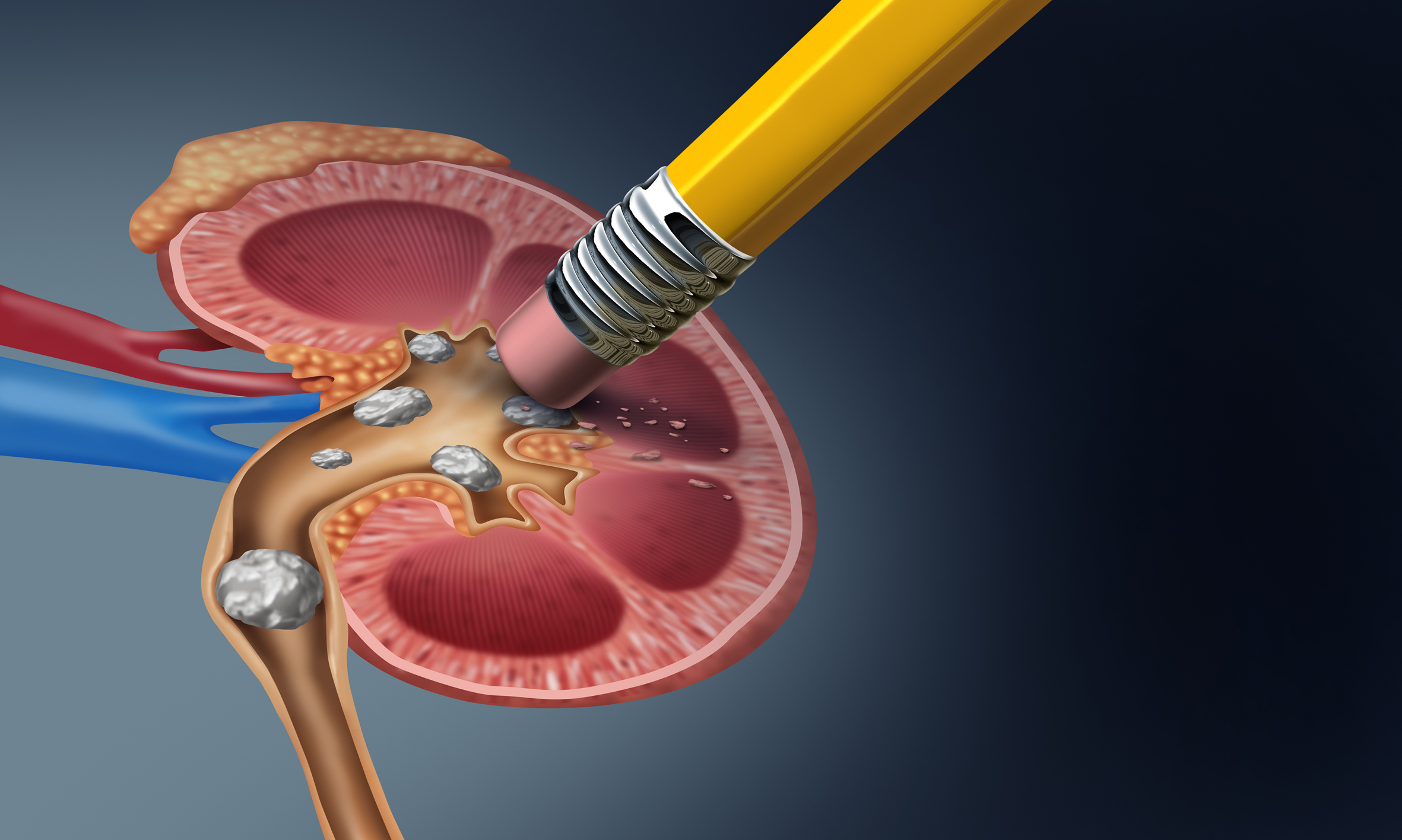Kidney stones are hard deposits that develop in the kidney due to mineral and acid salts that stick together; these stones are not harmful until they are silent at their place. Kidney stones have no definite shape; they have irregular shapes. These solid masses or crystals can vary in size; they can be as small as a grain of sand to the size of a ping pong ball. Stones are less than 5 mm in diameter and usually pass on their own through the urine. Still, sometimes, even a small stone can cause extreme pain in your body while passing out through the urinary tract. You don’t even realize that you have kidney stones unless you feel the symptoms.
Usually, kidney stones don’t bother you, but when they are in movement, they may get blocked into the ureter, which is the tube that drains out the urine from the kidneys to your bladder. A blocked stone may cause extreme pain and bleeding, or it may also trap urine there. To get rid of this, you may have to undergo surgery, as a stone can’t pass out on its own.
The small stones may pass out without causing any symptoms.
What are the symptoms of a kidney stone
Kidney stones are quite painful, although they do not cause any problem until they are static once they reach the bladder, they can cause various symptoms, the larger the stone, the more noticeable the symptoms are it can cause the backflow of the urine, kidneys may swell up and even the ureter muscle pain with inflammation.
- You may feel intense pain in the side and the lower back
- Another hurting symptom of kidney stones is that they cause pain in the lower abdomen and groin
- You may notice blood in the urine
- You may feel nauseous or may want to puke often
- You may have fever and chills
- Very smelly and cloudy urine
- You may feel pain that comes in waves and fluctuates in intensity
- It may cause pain or feel a burning sensation while urinating
- Being unable to urinate
Causes of kidney stones
Kidney stones are very common and can happen to one in 10 people. They are formed from a substance in your urine that combines into stones and passes normally through the urine, but when there isn’t enough urine, the substance gets concentrated and crystallizes, which happens due to lack of drinking water, this normally happens when you lack in consuming enough fluids, and that’s why kidney stones occur more likely. Calcium, oxalate, uric acid, phosphate, struvite, and xanthine are the chemicals that form the stones in your kidney. But there are other causes also that are responsible for kidney stones. Let’s read further for the causes of kidney stones that accommodate themselves into the list
1. Low urine volume
It is the major cause of kidney stones when your body remains dehydrated from exercises, working, or living in hot places the urine volume is low in your body, which concentrates and is dark in color maintaining this concentration and dehydration in your body does not dissolves the salts properly which results in kidney stones so one must drink enough Fluids to make at least 2.5 liters of urine every day.
2. Diet
Diet can be the reason for kidney stones calcium kidney stone has high levels of calcium in the urine. These levels may be high as it depends on how your body it handles calcium. It is not always due to how much calcium you consume. You must consume calcium in the limit to maintain your bone health, consult your health care provider regarding your calcium intake to protect from calcium kidney stones.
3. Obesity
It is a sure cause of kidney stones as it may change the acid levels in the urine leading to stone development.
Sometimes, kidney stones run in the family. There are chances of having it if you have a family history of stones, such as parents or siblings.
How long does it take to pass a kidney stone?
There are a couple of factors that determine how long does it take to pass kidney stones; let’s read the article below to know more about it:
1. Depends on the size
The natural passing of stone largely depends on its size. If the stone is small and less than 4mm, then 80 % of the time, it passes on its own; it may take around 3 days to pass out naturally; some stains that are more than 4 mm, i.e., 5mm to 6mm may require some treatment to pass, in 60 % cases it passes naturally within 45 days or more.
Stones that are large and quite bigger than 6mm require surgical medical treatment but, in very few cases, pass naturally and may take a time of a year or more.

2. Location of stones
How long does it take to pass a kidney stone depends on where it is residing. When the kidney stones at the end of the ureter, closer to where it attaches to the bladder than the end that attaches to the kidney, are likely to pass naturally there are studies that show that 9% of these stones pass on their own
Everybody is different. Some people may take a longer time, while some may take a shorter time to get rid of kidney stones. Men with a larger prostate may take a longer time to pass the kidney stones
How long does it take to pass a kidney stone?
According to the American Urological Association, the length of time required to pass a kidney stone located in the ureters is an average of 8 days if the stone is less than 2mm, about 12 days for a stone between 2mm and 4mm, and 22 days if the stone is between 4mm and 6mm. Generally, however, most kidney stones will pass on their own in 40 days.
When medical therapy is followed, a 2mm to 6mm kidney stone will pass within a few days or weeks, depending on the patient’s health. Antispasmodics medications are used to speed up the process of passing a stone. The drugs relax the ureters and increase the movement of passing a stone by up to 5-7 days; however, a urologist may give a take of 6 weeks for a kidney stone to pass on its own, but sometimes due to severe symptoms and other issues such as pain, gastric discomfort or urinary problems earlier intervention may be required.
How long does it takes to pass kidney stones depends on the four stages of passing these tiny or large substances. Kidney stones are very painful, but the person feels much better once it passes. When the stone leaves the kidney, it enters the tube that connects the Kidneys to the bladder. The pain keeps fluctuating, and the ureter supports the movement so that the stone may pass off.

Still, the stone may get stuck at the junction of the ureter and the renal pelvis or near the junction of the ureter and the bladder. When the stone reaches the bladder, the pressure builds up in the organ. This is the state of passing a kidney stone where you may feel an urgent need to urinate here, the pain improves, and the stone exists through the ureter. The kidney stone exists in your body when you urinate. The stone pushes out of the bladder and passes out your body through the urethra. You may feel no pain or very little pain at the passing stage of the stone. How long it takes to pass a kidney stone depends on how big it is. A stone that is 4 mm passes within a week or two, whereas a larger one may take about 6 to 7 weeks to get rid of your body.
How long does it take to pass a kidney stone also depends on the process followed by kidney stone be doing this your time, stone
1. Staying hydrated
Drinking plenty of water or fluids helps to flush out kidney stones and toxic agents from your body.

2. Avoid drinking caffeinated fluids
Try to keep low on tea, coffee, alcohol, and soda while you are trying to pass a kidney stone.
You can consume lemon water: this helps in speeding the process of passing a kidney stone as it contains citrate, a natural compound that helps in dissolving the kidney stones
3. Keep moving
When you are in pain, you would not like to make any efforts, but walking could ease the process of passing kidney stones faster and in less time.
How long does it take to pass a kidney stone when you are pregnant?
Kidney stones and pregnancy, no wonder it’s not going to be a cake walk there are studies that show that kidney stones have been observed in one of every 1,500 to 3000 pregnancies overall, 1 in 11 people get affected by kidney stones
Kidney stones in pregnancy occur generally in the third trimester. You may feel pain in the upper back, upper abdomen, and sides, which spreads to the lower abdomen and groin, increasing your troubles. You may feel nauseous, and frequent urination and blood in the urine is also a symptom.
Women’s bodies change a lot during pregnancy, which may cause kidney stones as the pregnancy passes. The growing fetus pushes the bladder, which increases many bathroom visits of a pregnant woman. This may annoy and irritate, due to which they may reduce the intake of fluids. They may avoid drinking enough water, and this lack of water may lead to the beginning of kidney stones.
Well, how long does it take to pass a stone by a pregnant woman depends on the size of the stone. Although the majority of kidney stones pass through the body, small stones excrete on their own out of your system, whereas the larger stones undergo a treatment process that requires a medical treatment intervention, whether it is a normal case or pregnancy case following negligence or leaving kidney stones untreated it may cause premature labor or it may affect normal labor which causes the severe effect to the health of a pregnant woman and the baby.

Sometimes, you undergo severe pain in your lower abdomen, for which you reach for emergency medical service and, after undergoing several tests, find that you have kidney stones. Many times, kidney stones are found by chance during tests for other reasons
Kidney stone tests may include:
- ultrasound
- CT scans
- x-rays, including an intravenous pyelogram (IVP), where dye is injected into your bloodstream before the x-rays are taken
Treatment for kidney stones
Kidney stones are treatable; some are treated with surgery, some are done with medicine, and some pass out on their own. It will take three to six weeks time to excrete out. However, you must undergo severe pain that hospital admission, and strong pain-relieving medication may be needed.
A doctor specializing in treating kidney stones is the best person to advise you on treatment.
How Do You Know When A Kidney Stone Is About To Pass?
Your body alarms you in some way when you are about to pass a kidney Stone. You may feel like urinating, or you may face urination issues, you feel an urgent need to urinate, or you may feel a problem with flow. Pain is the sign that the stone is advancing to pass out from your body.
What Is The Best Thing To Drink If You Have Kidney Stones?
You can consume the below-listed fluids to get rid of the kidney stones
1. Water
It’s the most required fluid for the smooth functioning of your body, especially your kidney. A hydrated body keeps the stone moving and prevents it from growing. One can drink 2 to 3 quarts per day.
2. Citrus juice
You can enjoy the bliss of citrus fruits to get rid of kidney stones as they contain citrate chemicals that can help break up small stones. It may not have a large effect on a stone, but its moderation consumption can help prevent kidney stones’ formation.
3. Apple cider vinegar
Another helping agent in the queue, known for its wonderful properties, is the acetic acid present in apple cider vinegar, which helps in dissolving kidney stones.
4. Pomegranate juice
Improves kidney function, flushes stones and toxins from your body, and reduces urine acidity levels, which can help prevent stones from forming in the future.
5. Basil juice
Another natural source of acetic acid, basil juice, can help break down kidney stones and reduce pain. Plus, it’s packed with nutrients. You can use fresh or dried basil leaves to make several cups of tea daily.
The amount of help these beverages will provide in passing a kidney stone continues to be steady, but they all have other health benefits. So, when consumed in moderation, they certainly won’t hurt you.













